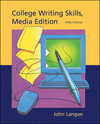 |  College Writing Skills, Media Edition, 5/e John Langan,
Atlantic Community College
ESL Pointers
Key Termsactive voice mode of expression in which the subject performs the action expressed by the verb. Ex.: The boy threw the ball.
count nouns words that name people, places, things, or ideas that can be counted and made into plurals, such as teacher, restroom, and joke.
definite article the; a "noun marker" — a signal that a noun will follow.
gerund -ing form of a verb used as a noun. Ex.: Smoking is not allowed.
Idiomatic particular to a certain language.
indefinite article a or an; a "noun marker" — a signal that a noun will follow.
noncount nouns words that refer to things or ideas that cannot be counted, such as water, bravery, snow.
nonspecific nouns words that refer to things or ideas whose specific identity the reader does not know; these nouns are introduced with the indefinite articlesa or an. Ex.: Today our cat brought a baby bird into the house.
passive voice mode of expression in which the subject receives the action instead of performing it. Ex.: The ball was thrown by the boy.
proper nouns words that name particular people, places, things, or ideas and are always capitalized.
qualifier a word that expresses the quantity of a noncount noun. Ex.: "some water"
specific nouns words that refer to things or ideas whose specific identity the reader does know; these nouns are introduced with the definite article the. Ex.: Today our cat brought a baby bird into the house.
transitive verbs verbs that need direct objects to complete their meaning. Ex.: The boy threw the ball.
|
|



 2003 McGraw-Hill Higher Education
2003 McGraw-Hill Higher Education